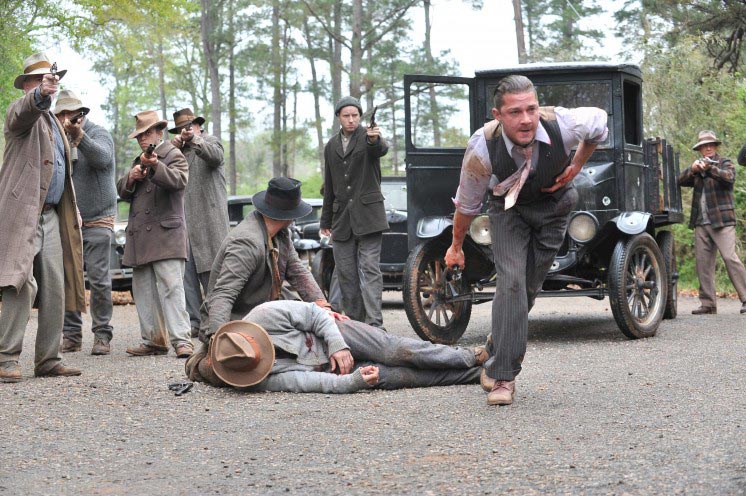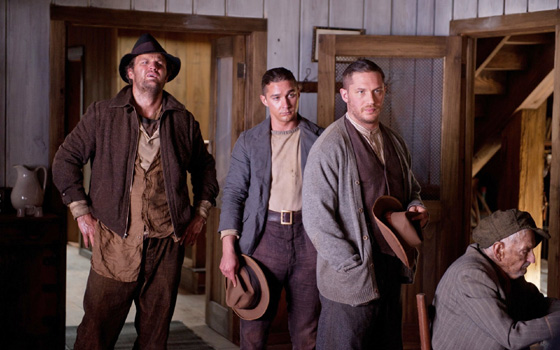

By Mike Wilmington Wilmington@moviecitynews.com
Wilmington on Movies: Lawless
LAWLESS (Three Stars)
U.S.: John Hillcoat, 2012

The sometimes exciting, sometimes pretentious crime movie Lawless takes place in Franklin County, Virginia — “The Wettest County in the World,” according to the book on which the picture is based. And it deals with a legendary family of moonshine-makers and bootleggers, the Bondurants, as they wage war against both their gangster rivals and the sadistic dude of a Chicago law man, Charlie Rakes (Guy Pearce), who’s come down south to shut them down.
Rakes is played as a pure, rotten villain, and the Bondurants are shown as at least semi-heroes, so the movie, somewhat like the crime thrillers and neo-noirs of the ’70s, scrambles our responses — and it would probably have been better if it scrambled them even more. Directed and written by the team of John Hillcoat and rocker-scenarist Nick Cave (who also joined forces on the nerve-jangling 2006 Aussie western The Proposition), Lawless is also a very arty film about a rustic underworld — and it’s arty in both good and grating ways.
The design and cinematography here remind you of James Agee and Walker Evans’ classic book on the Depression rural poor, “Let Us Now Praise Famous Men.” But the main characters here, the Bondurants, are far from impoverished. They’re prosperous criminals who make the best moonshine in Franklin County and also run a restaurant and are handy with guns. Maybe that’s what partly wrong with the movie; it tries to pant a realistic picture of 1931 Virginia and to bring us close to the Bondurants, but it also heroizes them in ways that don’t quite ring true. The book that Hillcoat and Cave adapted was written by a Bondurant ancestor, Matt (the grandson of Jack Bondurant), and sometimes the two Australian filmmakers tell the story like loving relatives too.
The movie boasts a near-all-star cast, and a very good-looking and charismatic one. The Bondurant Brothers are played by Jason Clarke (as Howard, the eldest and their terrifyingly fearless enforcer), Tom Hardy (as the near superhuman head man Forrest) and Shia LaBeouf (as Jack, the youngest and most ambitious of the,. Their ladies are played by Jessica Chastain (as Forrest’s ex-stripper friend), and Mia Wasikowska (as Jack’s lively preacher’s daughter of a girlfriend). Gary Oldman takes stage as the boss gangster Floyd Banner. There’s also a sympathetic sheriff who likes good moonshine whiskey (and good moonshiners), played by Bill Camp, and Jack’s fragile sidekick Cricket, played by Dane DeHaan. They’re all good, though strangely, none of these characters are very memorable, except for Pearce’s Charlie Rakes — a fancy dan with plucked eyebrows and expensive suits, reeking of cologne. Rakes makes a great villain. (His wardrobe alone makes you hate him.)
The story begins with the Bondurants as kids, and the revelation of Jack’s sensitivity: he won’t shoot a pig though the pig’s time has come. The movie then glides past World War I, which messes up Howard’s mind, the Spanish Influenza epidemic (with Forrest miraculously survives, the first of his many miracle) and into 1931, the Prohibition era and the thriving Bondurant hooch business. Forrest and Howard (now played by Hardy and Clarke) run it without Jack — you never know when another pig has to be killed — and we see Jack (now played by LaBeouf) chamfing at the liquor bit, enlisting Cricket to help him set up a rival operation, and then selling his booze to Banner.

But the movie doesn’t really plunge toward fraternal strife. Rakes is the antagonist and a mean one. He wants a piece of the action too and his brutality and sadism keeps escalating, from tar and feathers all the way to arson and cold-blooded murder. So do the Bondurants’ survival skills, none more formidable than Forrest‘s. At one point, Forrest has his throat slit and walks 12 miles through the snow — holding his throat together with his fingers — to get medical help. I assume this is an old Bondurant family yarn and maybe really happened. But if it didn’t, it should have.
Flawless is reminiscent in mood and style, and angle of vision of the period outlaw epics of the late ‘60s and ‘70s, especially Bonnie and Clyde, Thieves Like Us, Boxcar Bertha, and The Godfather 1 & 2. If it doesn’t really match its classic predecessors, or fulfill all its sometimes considerable ambitions, or justify its plentiful, harsh violence, it’s a movie that definitely achieves more than the average crime show these days.
For one thing, the movie, photographed by the French camera virtuoso Benoit Delhomme and designed by Chris Kennedy, is a triumph of period visualization. With its smoky vistas and tangled hillside forests, its antique ‘30s guns and cars, its frayed houses and rustic towns, the film feels right even when the characters don’t quite connect. The moviemakers get the mood. The movie looks down-at-heel, used, and as you watch it, there’s the sense of a sour wind smacking your face.
Cave’s script is stark and unsentimental, and it doesn’t sell out in the usual ways. But it also lacks the great scenes or the great character moments, of its best predecessors (or even of Hillcoat‘s and Cave‘s The Proposition). It’s also perhaps a little too hero-worshipful. A big reason that Bonnie and Clyde appealed so strongly to 1967 audiences, especially the college-aged ones, was because they connected the film‘s outlawry with resistance to the Vietnam War, a metaphor not available to today’s youngsters (though the parallels with drug laws still are). The movie also doesn’t make the leap into darkness that The Godfather movies did — which is part of the reason why The Godfather is a case of the finest, and Lawless is merely a good stiff shot.














